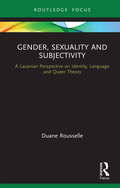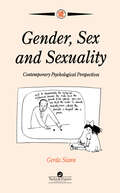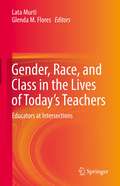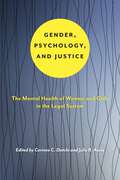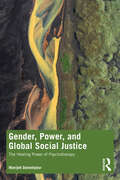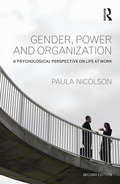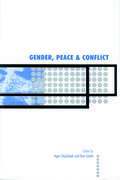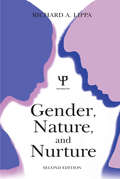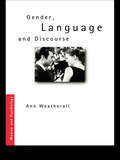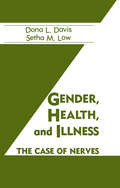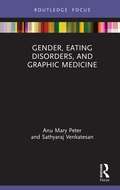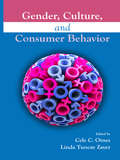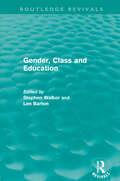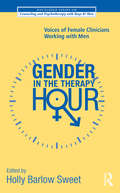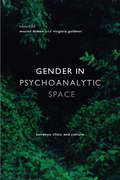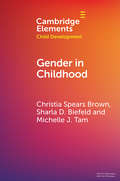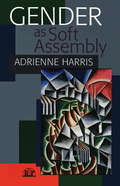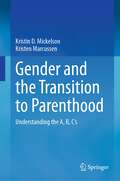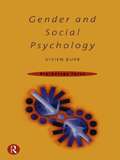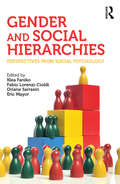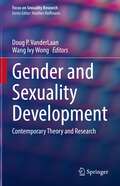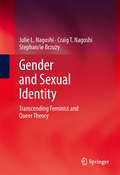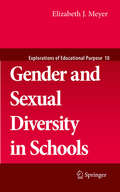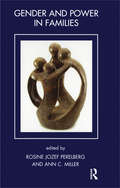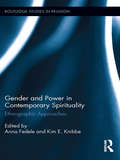- Table View
- List View
Gender, Sexuality and Subjectivity: A Lacanian Perspective on Identity, Language and Queer Theory (Routledge Focus on Mental Health)
by Duane RousselleOffering a concise yet comprehensive introduction to gender theory, this thought-provoking new book aims to make an intervention into the contemporary American paradigm of thinking gender and sexuality and offers a powerful challenge to the paradigm of social constructionism. Within each gender paradigm there are unacknowledged truths. The controversial claim of this book is that queer theory and intersectionality – and, more broadly, the social constructionist paradigm – have reached a limit. Indeed, it is possible that they are becoming regressive political gestures. However, there are possibilities of moving forward in this new area of transformation and Rousselle claims that a new logic of gender invention is opening up a new paradigm of thought. Part of the popular Routledge Focus on Mental Health series, this book will be of immense value to students and teachers who aim to understand in a basic way some of the various main paradigms, theories, and concepts within gender and sexuality studies. It will also be an important attempt to think beyond those paradigms and theories.
Gender, Sex and Sexuality: Contemporary Psychological Perspectives (Contemporary Psychology Ser.)
by Gerda SiannFor some time sex has been defined as the biological difference between men and women, and gender as the manner in which culture defines and constrains these differences. Feminine/masculine, male/female, women/men, boy/girl - terms of sexual and gender division like these permeate the way we think and talk about ourselves and each other. On most occasions we find their use non-problematic and people employ them easily, at other times, however, particularly if we are interested in psychology, we may wonder whether this ease is illusory.; One may speculate whether being a woman necessarily implies being "feminine". One may question why young women are often referred to as girls, while men are seldom referred to as boys. Is dressing in a stereotypically feminine manner a reliable indication that a woman is heterosexual? What about cross dressing? Why do these topics hold so much fascination for the media?; "Gender, Sex and Sexuality" examines the effects that the inequalities experienced between men and women have had on the psychologies of both sexes, and the battle to remove them. It aims to introduce the reader to current research and theories, drawing on novels, theatre, soap operas, as well as research for case histories.
Gender, Race, and Class in the Lives of Today’s Teachers: Educators at Intersections
by Glenda M. Flores Lata MurtiThis volume explores the professional experiences of a vast array of educators through a series of research essays that focus on the interplay of gender, race, class, and sexualities as well as how these dynamics influence the educators’ teaching. The volume illuminates this interplay not only in traditional classroom settings, but also in non-traditional contexts such as prisons and juvenile detention facilities, family education, dual-language immersion programs, early childhood education, and higher education, including teacher training programs. The concluding chapter, written by the editors, provides general recommendations for recruiting and retaining a more diverse teacher workforce worldwide. From autoethnographies to pláticas, testimonios and in-depth interviews, this qualitatively rich volume offers powerful and timely insights about the experiences of teachers who are too often overlooked. Gilda L. Ochoa, Professor of Chicana/o Latina/o Studies This illuminating book centers educators’ intersectional subjectivities and lived experiences, bringing to life the radical possibilities of transformative education. It is a much needed resource for anyone invested in understanding and advancing education as a catalyst for equity and social justice. Lorena Garcia, Associate Professor of Sociology & Latin American and Latino Studies
Gender, Psychology, and Justice: The Mental Health of Women and Girls in the Legal System (Psychology and Crime #6)
by Corinne Datchi Julie R AncisReveals how gender intersects with race, class, and sexual orientation in ways that impact the legal status and well-being of women and girls in the justice system. Women and girls’ contact with the justice system is often influenced by gender-related assumptions and stereotypes. The justice practices of the past 40 years have been largely based on conceptual principles and assumptions—including personal theories about gender—more than scientific evidence about what works to address the specific needs of women and girls in the justice system. Because of this, women and girls have limited access to equitable justice and are increasingly caught up in outdated and harmful practices, including the net of the criminal justice system. Gender, Psychology, and Justice uses psychological research to examine the experiences of women and girls involved in the justice system. Their experiences, from initial contact with justice and court officials, demonstrate how gender intersects with race, class, and sexual orientation to impact legal status and well-being. The volume also explains the role psychology can play in shaping legal policy, ranging from the areas of corrections to family court and drug court. Gender, Psychology, and Justice provides a critical analysis of girls’ and women’s experiences in the justice system. It reveals the practical implications of training and interventions grounded in psychological research, and suggests new principles for working with women and girls in legal settings.
Gender, Power, and Global Social Justice: The Healing Power of Psychotherapy
by Manijeh DaneshpourThis book analyses how practitioners can use psychotherapy as a healing mechanism, focusing on the intersection of gender, power, and social justice within the global context. It begins by interrogating the concept of social justice itself before examining men's and women’s issues from biological, sociological, contextual, and ecological perspectives. Each chapter covers individual, couple, and family therapy as well as training and supervising for heterosexual and homosexual individuals from a social justice standpoint. With a centered and balanced perspective about the impact of gender and power on men's and women's relationships to each other and their ecological contexts, Daneshpour aims to help mental health practitioners privilege client voices, promote justice in gendered relationships, and manage the impact of socio-political issues in therapeutic practice.
Gender, Power and Organization: A psychological perspective on life at work
by Paula NicolsonWork organizations are a major site of gender politics for professional women and men, and although there are more women in senior positions than ever before, these increased opportunities have not been gained without psychological consequences. Evidence-based and theoretically driven, the new edition of Gender, Power and Organization raises important questions about gender and power in the workplace, and the psychology of women’s advancement. Twenty years on from the first edition, it re-examines gender relations at work and asks why, despite many years of feminist critique and action, we are able to understand the dynamics of the workplace but fail to make them more representative. The struggles women face in professional and public life remain intense, not least because many men experience an increasing sense of threat to their long-term aspirations and professional positions. Using examples from recent research and the author's own consultancy experience, this important volume offers a fresh exploration of the psychology of gender and power at work, from the development of gender identities and roles, to explanations of bullying and sexual harassment in the organization. It offers an accessible survey of the subject for professional managers and students of leadership, psychology, management, sociology, gender, and women’s studies.
Gender, Peace and Conflict (International Peace Research Institute, Oslo (PRIO))
by Dan Smith Inger Skjelsbæk- What impact does gender difference make to political decision-making? - Will the political empowerment of women contribute to a more peaceful world? The role of gender has been increasingly recognized as central to the study and analysis of the traditionally male domains of war and international relations. This book explores the key role of gender in peace research, conflict resolution and international politics. Rather than simply 'add gender' the aim is to transcend different disciplinary boundaries and conceptual approaches to provide a more integrated basis for future study. To this end it uniquely combines theoretical chapters alongside empirical case studies to demonstrate the importance of a gender perspective to both theory and practice in conflict resolution and peace research. The theoretical chapters explore the gender relationship and engage with the many stereotypical dichotomies like femininity and peace and masculinity and war. The case study chapters (drawing on examples from South America, South Asia and Europe, including former Yugoslavia) move beyond theoretical critique to focus on issues like sexual violence in war, the role of women in military groups and peacekeeping operations and the impact of a 'critical mass' of women in political decision-making. Gender, Peace and Conflict will provide an invaluable survey and new insights to a central area of contemporary research. It will be essential reading for academics, students and practitioners across peace studies, conflict resolution and international politics.
Gender, Nature, and Nurture
by Richard A. LippaThis engaging text presents the latest scientific findings on gender differences, similarities, and variations--in sexuality, cognitive abilities, occupational preferences, personality, and social behaviors. The impact of nature and nurture on gender is examined from the perspectives of genetics, molecular biology, evolutionary theory, neuroanatomy, sociology, and psychology. The result is a balanced, fair-minded synthesis of diverse points of view. Dr. Lippa's text sympathetically summarizes each side of the nature-nurture debate, and in a witty imagined conversation between a personified "nature" and "nurture," he identifies weaknesses in the arguments offered by both sides. His review defines gender, summarizes research on gender differences, examines the nature of masculinity and femininity, describes theories of gender, and presents a "cascade model," which argues that nature and nurture weave together to form the complex tapestry known as gender.Gender, Nature, and Nurture, Second Edition features:*new research on sex differences in personality, moral thought, coping styles, sexual and antisocial behavior, and psychological adjustment;*the results of a new meta-analysis of sex differences in real-life measures of aggression;*new sections on non-hormonal direct genetic effects on sexual differentiation; hormones and maternal behavior; and on gender, work, and pay; and *expanded accounts of sex differences in children's play and activity levels; social learning theories of gender, and social constructionist views of gender. This lively "primer" is an ideal book for courses on gender studies, the psychology of women, or of men, and gender roles. Its wealth of updated information will stimulate the professional reader, and its accessible style will captivate the student and general reader.
Gender, Language and Discourse (Women and Psychology)
by Ann WeatherallIs language sexist? Do women and men speak different languages?Gender, Language and Discourse uniquely examines the contribution that psychological research - in particular, discursive psychology - has made to answering these questions. Until now, books on gender and language have tended to be from the sociolinguistic perspective and have focused on one of two issues - sexism in language or gender differences in speech. This book considers both issues and develops the idea that they shouldn't be viewed as mutually exclusive endeavours but rather as part of the same process - the social construction of gender. Ann Weatherall highlights the fresh insights that a social constructionist approach has made to these debates, and presents recent theoretical developments and empirical work in discursive psychology relevant to gender and language.Gender, Language and Discourse provides the most comprehensive and up-to-date discussion of the gender and language field from a psychological perspective. It will be invaluable to students and researchers in social psychology, cultural studies, education, linguistic anthropology and women's studies.
Gender, Health And Illness: The Case Of Nerves (Health Care For Women International Publications)
by Setha M. Low Dona L. DavisFirst published in 1989. Routledge is an imprint of Taylor & Francis, an informa company.
Gender, Eating Disorders, and Graphic Medicine
by Sathyaraj Venkatesan Anu Mary PeterDeveloping an understanding of eating disorders beyond the biological/medical framework has become a necessity in present times, especially when eating disorders are swiftly spreading deep roots across the world. In view of the multidimensional etiology of eating disorders, there are increased efforts towards understanding its phenomenological, cultural, and other related non-medical aspects, and Gender, Eating Disorders, and Graphic Medicine leaps past the prevalent notions on eating disorder, and contributes to the developing corpus of affective knowledge on eating disorders among women through comics and graphic medicine. Taking cues from select graphic narratives on eating disorders, this book attempts to posit graphic medicine as one of the most befitting modes of life writing. This book is distinctive in that it is an attempt not only to explore the multi-dimensional etiology of eating disorders in women using graphic medicine narratives but also to understand how graphic medicine humanizes eating disorders by offering a unique ingress into women’s phenomenological experience of eating disorders.
Gender, Culture, and Consumer Behavior
by Cele C. Otnes Linda Tuncay ZayerThis book covers the gamut of topics related to gender and consumer culture. Changing gender roles have forced scholars and practitioners to re-examine some of the fundamental assumptions and theories in this area. Gender is a core component of identity and thus holds significant implications for how consumers behave in the marketplace. This book offers innovative research in gender and consumer behavior with topics relevant to psychology, marketing, advertising, sociology, women’s studies and cultural studies. It offers 16 chapters of cutting-edge research on gender, international culture and consumption. Unique to this volume is its emphasis on consumption and masculinity and inclusion of topics on a rapidly changing world of issues related to culture and gender in advertising, communications, psychology and consumer behavior.
Gender, Class and Education (Routledge Revivals)
by Stephen Walker Len BartonFirst published in 1983, Gender, Class and Education is a collection of papers that formed presentations at the Westhill Sociology of Education Conference in January 1982, and is the fifth such collection to emerge from the annual conference. The conference theme, ‘Race, Class and Gender’, was not only chosen because of its topicality, but also to provide a framework for debate between educational researchers and teachers. The papers focus on the reproduction of gender relations through education and provide important insights into how this process works, how it is resisted in schools and colleges, and the possibilities for radical intervention. This volume includes three teaching bibliographies on gender and education which were not presented at the conference, but were compiled specially for the book.
Gender in the Therapy Hour: Voices of Female Clinicians Working with Men (The Routledge Series on Counseling and Psychotherapy with Boys and Men)
by Holly Barlow SweetThere is no shortage of literature about working with men in counseling and psychotherapy, but almost none of it addresses the unique issues that a female clinician can face with a male client. These women do not have a basis for a complete understanding of the impact our society’s ideas about gender can have on a man, his masculinity, and his feelings toward talk therapy, in part because they are not men themselves. The contributors to this book, all female clinicians who have worked extensively with men, have set out to provide their female peers with a guide for therapeutically engaging and helping men. Chapters explore how each author became involved in men’s issues, case studies and examples from her own practice that illustrate her approach, and her own assessment of what works best with male clients. Topics considered include core treatment issues, such as transference and counter-transference, beginning and ending therapy with men, and ethical dilemmas; working in different therapy modalities; and doing therapy with diverse populations of men. The book concludes with an edited transcript of a discussion amongst the authors about their personal experiences working with male clients. This will be an important book for all female therapists who work with male clients and are looking for ways to better understand and tailor their approaches to meet the needs of men in therapy.
Gender in Psychoanalytic Space: Between Clinic and Culture
by Muriel Dimen Virginia Goldner"Here is a book that both creates and illuminates the space where psychoanalysis, feminism, gender studies, and sexualities join. . . . A collection of cutting edge work that brims with the excitement of new possibility. " -Dr. Sam Gerson Combining clinical psychoanalysis with feminism, postmodernism, and psychoanalytic theory, this pioneering collection represents a major step forward in psychoanalytic gender studies.
Gender in Childhood (Elements in Child Development)
by Christia Spears Brown Sharla D. Biefeld Michelle J. TamGender is a highly salient and important social group that shapes how children interact with others and how they are treated by others. In this Element, we offer an overview and review of the research on gender development in childhood from a developmental science perspective. We first define gender and the related concepts of sex and gender identity. Second, we discuss how variations in cultural context shape gender development around the world and how variations within gender groups add to the complexity of gender identity development. Third, we discuss major theoretical perspectives in developmental science for studying child gender. Fourth, we examine differences and similarities between girls and boys using the latest meta-analytic evidence. Fifth, we discuss the development of gender, gender identity, and gender socialization throughout infancy, early childhood, and middle childhood. We conclude with a discussion of future directions for the study of gender development in childhood.
Gender as Soft Assembly (Relational Perspectives Book Series #25)
by Adrienne HarrisGender as Soft Assembly weaves together insights from different disciplinary domains to open up new vistas of clinical understanding of what it means to inhabit, to perform, and to be, gendered. Opposing the traditional notion of development as the linear unfolding of predictable stages, Adrienne Harris argues that children become gendered in multiply configured contexts. And she proffers new developmental models to capture the fluid, constructed, and creative experiences of becoming and being gendered. According to Harris, these models, and the images to which they give rise, articulate not only with contemporary relational psychoanalysis but also with recent research into the origins of mentalization and symbolization.In urging us to think of gender as co-constructed in a variety of relational contexts, Harris enlarges her psychoanalytic sensibility with the insights of attachment theory, linguistics, queer theory, and feminist criticism. Nor is she inattentive to the impact of history and culture on gender meanings. Special consideration is given to chaos theory, which Harris positions at the cutting edge of developmental psychology and uses to generate new perspectives and new images for comprehending and working clinically with gender.
Gender and the Transition to Parenthood: Understanding the A, B, C’s
by Kristin D. Mickelson Kristen MarcussenThis book provides a new approach by examining gender and the transition to parenthood by using the actor partner interdependence model. Unlike other books which focus on the individual perspective of becoming a parent (especially for mothers), this book examines how couples and individuals successfully navigate this important life passage. This book covers a mix of psychological and sociological studies on the transition to parenthood. Readers will learn about the affective, behavioral, and cognitive aspects of this transition in early 21st century America and how it has changed in the past three decades. The book is aimed at graduate students, researchers and professionals who are interested in an interdisciplinary approach to this most formative passage in adult life. By bringing together past and current research, this book tells the story of becoming parents in 21st century America from his, her, and their points of view.Actor-partner interdependence model approachAffective, behavioral and cognitive processesBroad review of gender and the transition
Gender and Social Psychology
by Vivien BurrExplaining theory and research in an accessible but thorough manner, Gender and Social Psychology critically evaluates the contribution that psychology has made to the study of gender, examining key issues such a family roles and parenting, inequalities in education, jobs and pay, and the effects of media representation of the sexes.
Gender and Social Hierarchies: Perspectives from social psychology
by Eric Mayor Klea Faniko Fabio Lorenzi-Cioldi Oriane SarrasinGender and Social Hierarchies offers a fresh and coherent picture of applied research from within social psychology on the intricate relationship between gender and social status. It comprises a collection of innovative approaches which seek to understand the pervasiveness of status asymmetry between gender categories. Drawing upon recent theoretical advances in gender psychology, the book provides tools for developing practical and political recommendations to address and resolve status inequality today. Each chapter examines a different aspect of the impact that gender-based social hierarchies have on people’s lives. Part One explores the consequences of gender stereotypes in school, higher education, and in professional settings. The struggles faced by women in the workplace are discussed in Part Two, featuring topics such as work-life balance, the ‘glass cliff’, and the lack of support for affirmative action. Part Three is devoted to the antecedents and consequences of gender-based forms of prejudice, such as discrimination against gay men, and against women within cultural minorities. The book concludes with some practical suggestions for working towards lasting and beneficial change. Gender and Social Hierarchies will appeal to scholars and students across the social sciences and offers important insights to practitioners and policy-makers.
Gender and Sexuality Development: Contemporary Theory and Research (Focus on Sexuality Research)
by Doug P. VanderLaan Wang Ivy WongThis book showcases a wealth of knowledge and insight on gender and sexuality development. With contributions from leading researchers, it covers a comprehensive set of topics at the forefront of the field and strikes a balance between traditional and emerging areas of study. Given that gender and sexuality are shaped by myriad influences, this book is modelled on an interdisciplinary perspective and delves into biological, comparative, psychological, cognitive, social, cultural, and clinical approaches. In so doing, this collection conveys the rich tapestry of gender and sexuality science and will hold value for many. For those already in the field, this book provides an excellent resource for brushing up on the latest and for inspiring the next phases of scientific investigation. Those who are newer to the field, including undergraduate and graduate students, stand to gain tremendously from not only the thoughtful and informative content, but also from the interdisciplinary approach modelled throughout the book. Beyond academia, this book is a valuable resource for clinicians and policy makers who deal with child and adolescent issues.
Gender and Sexual Identity
by Julie L. Nagoshi Craig T. Nagoshi Stephan Ie BrzuzyThe first comprehensive presentation of an explicitly transgender theory. This theory goes beyond feminist and queer theory by incorporating the idea of fluid embodiment and lived experience in conceptualizing gender and sexual identity. Beyond developing a formulation of transgender theory that incorporates the socially constructed, embodied, and self-constructed aspects of identity in the narrative of lived experiences, the authors discuss the implications of this "trans-identity theory" for theory, research, and practice.
Gender and Sexual Diversity in Schools
by Elizabeth J. MeyerIssues related to gender and sexual diversity in schools can generate a lot of controversy, with many educators and youth advocates under-prepared to address these topics in their school communities. This text offers an easy-to-read introduction to the subject, providing readers with definitions and research evidence, as well as the historical context for understanding the roots of bias in schools related to sex, gender, and sexuality. Additionally, the book offers tangible resources and advice on how to create more equitable learning environments. Topics such as working with same-sex parented families in elementary schools; integrating gender and sexual diversity topics into the curriculum; addressing homophobic bullying and sexual harassment; advising gay-straight alliances; and supporting a transgender or gender non-conforming student are addressed. The suggestions offered by this book are based on recent research evidence and legal decisions to help educators handle the various situations professionally and from an ethical and legally defensible perspective.
Gender and Power in Families
by Rosine Jozef Perelberg Ann C. MillerThe systems approach to the family is based on the assumptions that there is equality between men and women in the family, and that women and men are treated equally in clinical practice. The contributors to this book challenge these hidden assumptions, discussing the issues from both a conceptual and clinical viewpoint. They argue strongly that questions of gender and power should be central to family therapy training and practice.
Gender and Power in Contemporary Spirituality: Ethnographic Approaches (Routledge Studies in Religion #26)
by Anna Fedele Kim E. KnibbeThis book explores the entanglements of gender and power in spiritual practices and analyzes strategies used by spiritual practitioners to attain what to social scientists might seem an impossible goal: creating spiritual communities without creating gendered hierarchies. What strategies do people within these networks use to attain gender equality and gendered empowerment? How do they try to protect and develop individual freedom? How do gender and power nevertheless play a role? The chapters in this book together and separately demonstrate that, in order to understand contemporary spirituality, the analytical lenses of gender and power are essential. Furthermore, they show that it is not possible to make a clear distinction between established religions and contemporary spirituality: the two sometimes overlap, and at other times spirituality distances itself from religion while reproducing some of its underlying interpretative frameworks. This book does not take the discourses of spiritual practitioners for granted, yet recognizes the reflexivity of spiritual practitioners and the reciprocal relationship between spirituality and disciplines such as anthropology. The ethnographic descriptions of lived spirituality included in this volume span a wide range of countries, from Portugal, Italy, and the Netherlands to Mexico and Israel.
